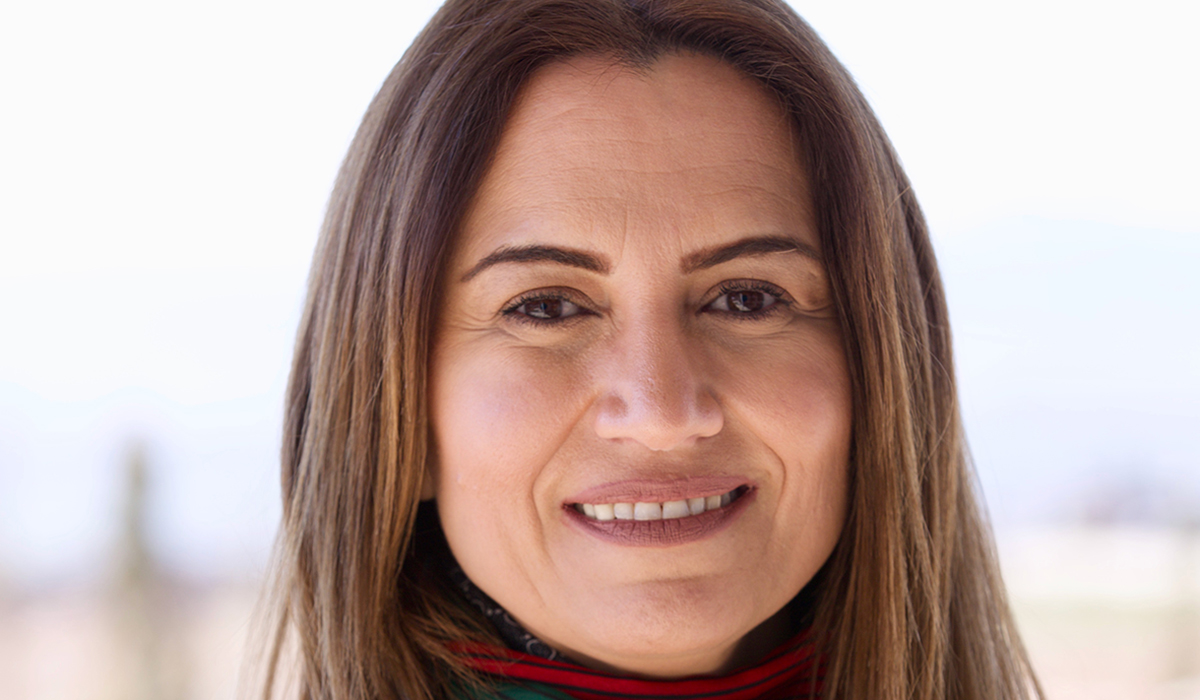Peace cannot be achieved with force, but through dialogue and kindness
Date:
Abir El Tawm Bitar, 46, is determined to share her newfound openness to foster peaceful dialogues towards overcoming the trauma of past and present conflicts in her community. She is one of 85 women from Tripoli and Baalbek participating in women-led community dialogues under the ‘Creating Space for Women Peacebuilders’ project led by International Alert and UN Women and generously supported by the Government of the United Kingdom.

For Abir El Tawm Bitar and her family of four children, fear and perseverance have been a significant part of their lives. The longtime resident of Qaa, a village in Baalbek, Lebanon, has spent 22 years working in Qaa Municipality, after graduating in Sociology from the Lebanese University in Zahle.
Qaa is home to 6,000 residents and is located 10 kilometers from the Syrian border. The quaint northern village has witnessed plenty of bloodshed and conflict during Lebanon’s 15-year Civil War to more recent attacks by non-state armed groups. Qaa’s troubled history has created tension in the community between members from different religious and political backgrounds, and with the more recent influx of Syrian refugees also fleeing danger.
Abir recalls, “I was only 16-years-old when armed clashes happened in 1989-1990. The image that remains vivid in my mind is of the meeting place for the victims’ parade in front of my house, where every day they would meet to carry coffins to graves. I will never forget when a family of three – a father, son and daughter – were taken together. Every day, we would wonder if there would be more victims.
In 2016, 30,000 Syrian refugees arrived to Qaa. The influx was quite a shock to the small community. There was a slight fear as to how we would readjust to the new situation and welcome the new residents. There was fear of the other, and with many refugees coming in, people were worried this would create tension with the newcomers”.
Abir is one of 85 women enrolled in the 10-month ‘Creating Spaces for Women Peacebuilders’ project aiming to support women-led community dialogue by International Alert and UN Women. The project promotes intergenerational and cross-community dialogue as a way to tackle conflicts and unpack mainstream narratives of the civil war with women peacebuilders.
Eight learning and dialogue sessions were organized with 45 women from Qaa, Ersal, and Baalbek, and covered topics such as conflict resolution, communication skills, mediation, women’s roles in peace and security, as well as skills on how to design a campaign, how to implement initiatives, and how to monitor conflict dynamics in the Bekaa context using monitoring tools. Cultural exchange activities also took place in the Bekaa, in the villages of Qaa, Ersal, Baalbek, between women from different backgrounds.
“During the dialogue sessions, we were a group of women (Lebanese, Syrians and Palestinians) from different cultural and religious backgrounds and villages, but also with different individual and collective memories of civil war and many other incidents that took place in the Bekaa. Through sitting together, we really got to know each other and learned what each of us had lived through, and you can’t help but respect their strength in the face of all this sorrow.”
Abir learned to apply what she learned in the sessions during problems in her community. Her new skills of applying dialogue and mediation helped her see things from all perspectives and find a reasonable solution.
“The co-facilitators were able to enlighten us to share even the most hidden memories and strengthen trust not only in ourselves but with others through the art of listening,” Abir explains. “It also confirmed for me that women have an important role in society and we can be decision makers too. It boosted my confidence, and made me more ready to voice my opinions and not sit aside when tensions begin to rise.
These lessons I learned are rippling out in my daily life, I now feel I have a responsibility to give my newfound openness to the people I meet in the village - to pass it along and improve our society as a whole. Peace cannot be achieved with force, but with dialogue and tolerance, and if we want a peaceful society, this is how we must always be.
Now with the elections coming, there could be a lot of tensions between supporters of different political parties. I now feel ready to apply the mediation skills I learned to help when tensions or conflicts arise and find a way for them to communicate their needs peacefully”.